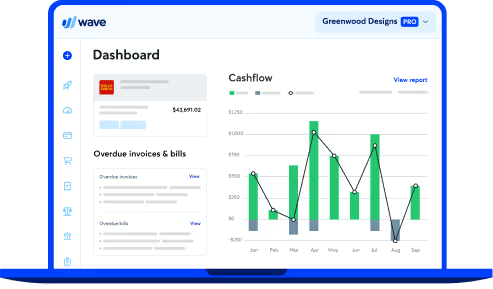
How big is a “small” business? Here’s why it matters.

A version of this article, by Wave’s co-founders James Lochrie and Kirk Simpson, originally appeared on Forbes.com.
We’d like to propose the following resolution: Let’s stop pretending that a business with $35 million in revenue could be considered a “small business.” Or that a facility employing 1,500 people could be considered “small.”
It’s a silly resolution, right? After all, who would ever define small businesses with this kind of metric? Well, just about every survey you’ve ever read, and nearly every stat you’ve ever heard quoted about small businesses, is really talking about businesses defined by crazy parameters like this.
Let’s take a step back:
In ordinary conversations, if you ask someone to describe a small business, they paint a picture that includes that lovely couple who run the corner store, perhaps, or the freelance web designer working from the live/work loft space in the newly fashionable part of town. Maybe the furniture-finishing workshop, with their half-dozen artisans and beautiful craftsmanship. Or the farmer operating with the help of dedicated family members. And that kind of a company, with 9 employees or less, makes up 95% of small businesses according to the most current U.S. census data. (In fact, just the “non-employer firms” — i.e., solo entrepreneurs or freelancers, with no employees at all — make up more than 78% of all businesses.)
Amazingly, though, the moment a survey is commissioned, the moment pollsters, pundits and politicians get into the conversation, real small businesses like this get lumped in with businesses that are anything but small by common-sense definitions.
Cases in point:
- a recent Wells Fargo/Gallup poll about small business optimism included businesses with revenue as high as $20 million.
- a recent Capital One report on small business confidence capped revenue at $10 million.
- a recent MasterCard survey about small business retail sales growth included businesses with up to 199 employees
The resulting problem, of course, is that multi-million dollar operations with hundreds of employees have absolutely nothing in common with the real small businesses we all tend to think of. A two-person shop has a radically different perspective than a 200-person operation, on just about every topic. Customers, human resources, access to capital, day-to-day operations, and on and on — real small businesses with 9 employees or less simply work differently, think differently, and have radically different needs.
Still not convinced that there’s a problem? Get a load of the U.S. Small Business Administration (SBA). Their standard definition of a small business includes operations with up to $7 million in revenue or 500 employees, depending on the industry. And there are countless exceptions, with revenue thresholds set as high as $35.5 million, and employee counts as high as 1,500! (See the SBA’s PDF.) No kidding: Railroads with 1,500 employees are considered small! Food service contractors with $35.5 million in revenues are considered small!
Now, we’ll stop mid-rant and admit that reports and studies grouping all these businesses together may be valuable to someone. Who knows? But to label these reports as representative of small businesses defies logic.
And what about the decision-making that comes out of this kind of report? Imagine a well-meaning local politician trying specifically to help the real small businesses on Main Street, but basing his or her decisions on data that’s skewed by 199-person factories. It’s scary to wonder how much harm has been done by these studies that merge the big and the small into one quasi-homogeneous group.
So at Wave, we’re taking a stand.
Wave represents real small businesses, in North America.Businesses with 9 employees or less, including solo entrepreneurs and freelancers. And that’s why we’re calling on companies, government, media and pollsters to give real small businesses a real voice. Stop giving your insights a “small business” label unless you’re truthfully representing real small businesses. And more importantly, start finding ways to represent the voices of real small businesses with 9 employees or less. These companies make up 95% of businesses — surely that’s a large enough demographic to matter!
At Wave, we’re also determined to be an active part of the solution. Are you a company, a media outlet or a resource that shares info about real small businesses? Contact us and we’ll work together to make sure that businesses with 9 employees or less get the representation they deserve.
So join us! We encourage you to take a stand in making sure real small businesses are heard.
— James Lochrie and Kirk Simpson, co-founders, Wave Accounting and Wave Payroll
(and create unique links with checkouts)
*While subscribed to Wave’s Pro Plan, get 2.9% + $0 (Visa, Mastercard, Discover) and 3.4% + $0 (Amex) per transaction for the first 10 transactions of each month of your subscription, then 2.9% + $0.60 (Visa, Mastercard, Discover) and 3.4% + $0.60 (Amex) per transaction. Discover processing is only available to US customers. See full terms and conditions for the US and Canada. See Wave’s Terms of Service for more information.
The information and tips shared on this blog are meant to be used as learning and personal development tools as you launch, run and grow your business. While a good place to start, these articles should not take the place of personalized advice from professionals. As our lawyers would say: “All content on Wave’s blog is intended for informational purposes only. It should not be considered legal or financial advice.” Additionally, Wave is the legal copyright holder of all materials on the blog, and others cannot re-use or publish it without our written consent.


























